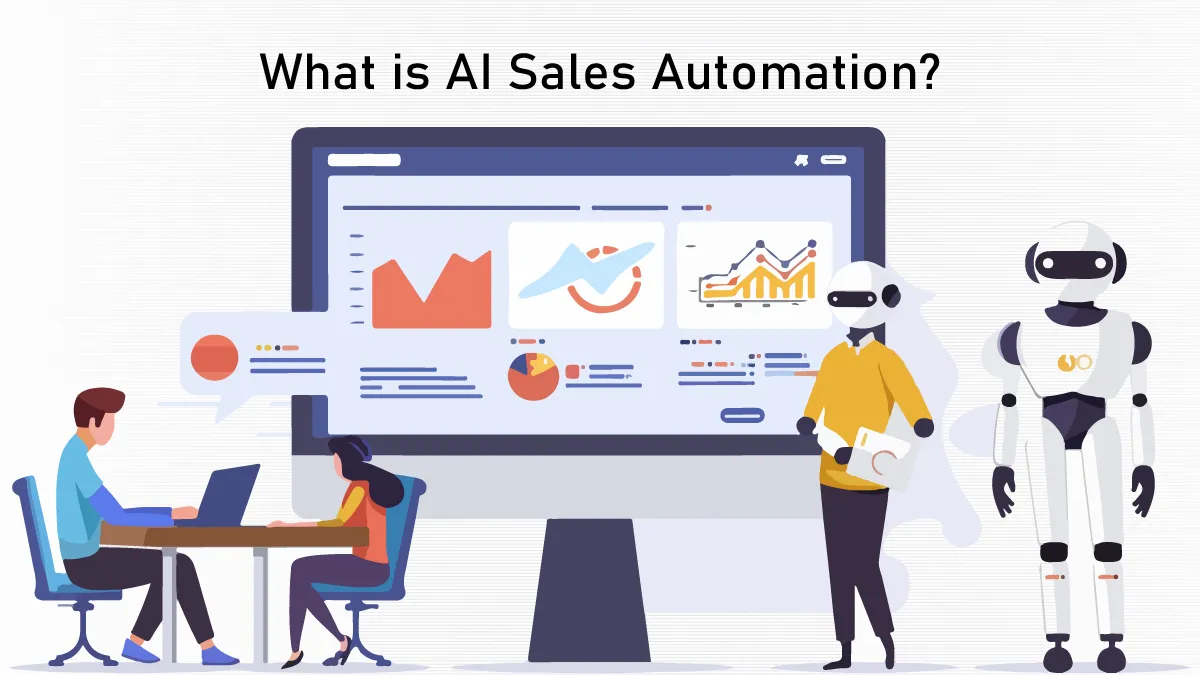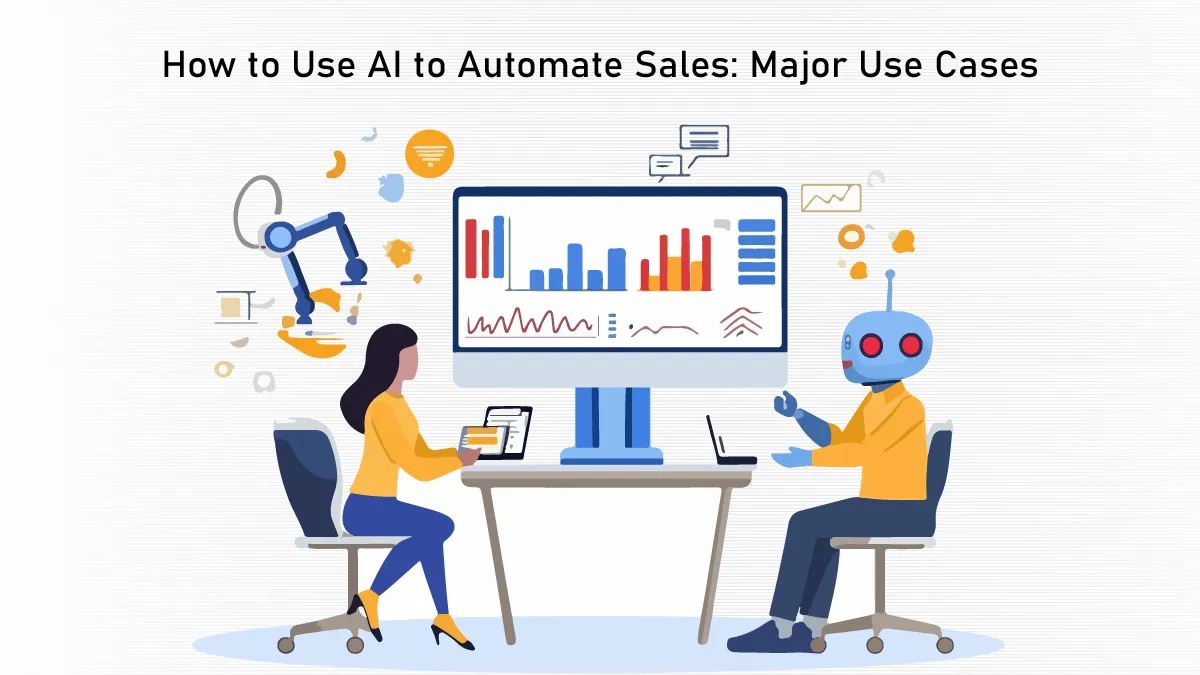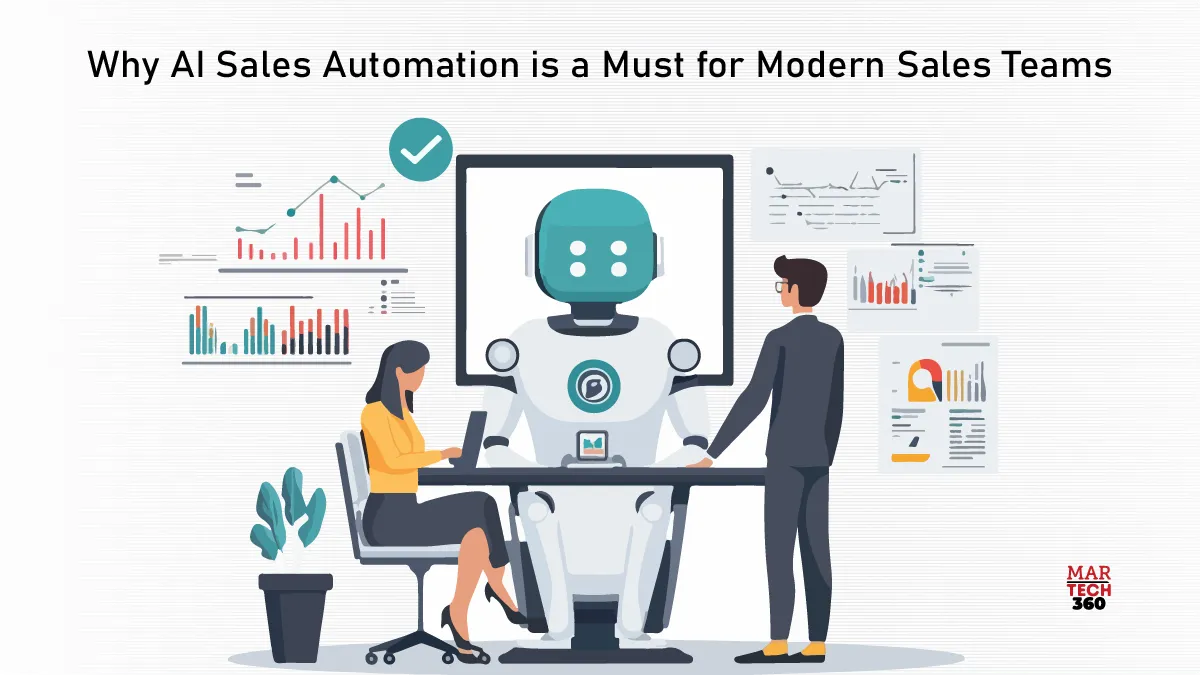Although it still sounds futuristic, sales teams currently utilize artificial intelligence on a daily basis, and its use is expected to grow significantly over the next few years. It’s time to reconsider if your business hasn’t adopted AI sales automation yet.
In addition to automating time-consuming administrative tasks, AI enhances customer relations. Customers that are satisfied also spend more money, which improves your bottom line.
So, what’s with this tech-savvy sales strategy? And how to use AI to automate sales? Let’s take a closer look at it.
What is AI Sales Automation?

AI sales automation improves sales processes, lead generation, and effectiveness. It can help perform several tasks such as:
- Automating tasks: AI can automate repetitive tasks like data entry, scheduling, and follow-ups.
- Analyzing data: AI can analyze consumer data like demographics and online activity. It can also analyze previous conversations.
- Predicting behavior: AI is able to forecast revenues and anticipate consumer behavior.
- Personalizing interactions: AI can create tailored pitches and personalize buyer encounters.
- Providing insights: AI can give sales teams useful information to help them make decisions.
- Optimizing pricing: AI can use algorithms to analyze past transactions and find the best price for each proposal.
A Forbes Business Council article claims that sales and marketing automation may spur growth. It can boost productivity, customize customer experiences, and align sales and marketing efforts.
How to Use AI to Automate Sales: Major Use Cases

According to estimates, AI has the potential to generate between $1.4 and $2.6 trillion in sales and marketing value. (I don’t know of any other justification for adopting AI if that isn’t one.)
Artificial intelligence has multiple applications in the sales industry. Salesforce’s research found that high-performing teams are 4.9 times more likely than unsuccessful ones to use AI in their sales cycle.
How, therefore, can you improve sales using AI’s capabilities?
See the following list of use cases of AI sales automation.
Also Read: B2B Prospecting: Comprehensive Strategies and Best Practices for Success
1. Sales Forecasting
There are artificial intelligence systems that can foresee or predict results based on past data to guide future actions. Typical sales forecasting made by sales AI systems include:
- prospects or deals that are most likely to close.
- possibilities or deals to pursue next.
- new clients who could be considering your offerings.
Now, the technology in use and the caliber of the data determine how accurate such forecasts are. But the truth is that AI can tell you who is most likely to make a purchase in the future if you give it the correct inputs in the past and present.
Internally, your sales team can benefit from predictive forecasting as well. Sales managers can take proactive measures based on the figures by using AI to predict their team’s success for the quarter well in advance.
2. Key Points and Provide Action Items from Meetings and Calls
Every salesperson calls both customers and prospects. Sales calls take time and effort to summarize and create action items for the sales teams based on the call. Humans should no longer perform this labor by hand.
AI can now summarize calls accurately, often just seconds after they end. All participants can then automatically receive these summaries via email. These summaries can also be used by AI to automatically create next actions for each caller depending on the topics covered.
These are simple jobs. Outsourcing them to AI saves human resources. They can be used for more valuable work, like closing more deals.
3. Analyze Sales Calls
Furthermore, it goes beyond basic action items and call summaries. Salespeople can learn a lot from each contact they make. It reveals a prospect’s view of your offering, their problems, and their key desires. However, manually obtaining all of this data on a case-by-case basis is difficult.
For this reason, progressive salesmen are using AI to evaluate their calls. AI can now tell you exactly what happened in a conversation. It can also explain its significance for completing a transaction. It can even grasp the tone and mood of the calls. This helps it find issues that affect the sale’s success.
4. Suggest Next Steps for Sales Reps
Simply determining what to do and what to prioritize next is a major obstacle to sales productivity. Your sales team works on numerous deals at once and has a lot on their plate. They lose out on chances to close more deals if they don’t prioritize and carry out the proper actions in the correct order.
AI sales automation can be beneficial.
AI may make real-time recommendations for each sales rep’s next action. This is based on all the data about that offer and its stage. AI acts as a sales manager and coach. It is always available. It guides reps to the exact actions needed for peak sales productivity.
5. Auto-Generate Winning Sales Emails and Subject Lines
Email outreach is vital for most sales organizations. It applies to both outbound prospects and inbound leads. Performing all of this outreach by hand becomes tiresome and repetitious. Additionally, it isn’t as successful as it may be.
Salespeople may create captivating subject lines and email copy from scratch in a matter of seconds with the aid of generative AI. This means you can use AI to greatly expand your emails’ reach. You could automate email creation or generate drafts and then refine them.
Also, AI can instantly create hundreds or thousands of catchy email subject lines. This will increase the chances of your emails being opened.
6. Discover New In-Market Leads
AI can identify in-market leads by analyzing data to find patterns. It uses your organization’s key parameters to do this.
AI can find new people who are perfect for your target leads. It does this by analyzing your best leads and then third-party databases.
7. Predict Your Close Rate
AI can assess the likelihood that leads in your database will close with ever-increasing accuracy by using its predictive capabilities. AI can find leads with a higher chance of closing. It does this by checking vast amounts of market and historical data. It can also identify the best time to contact those leads. As a result, your sales pipeline gains a whole new degree of predictability and efficacy.
8. Gauge Buying Readiness
Using past data and behavioral indicators, AI can also forecast when leads are prepared to make a purchase. This means you should work on the most likely leads first. Properly prioritizing them will greatly increase your close rate.
It also ensures that you don’t pass on leads who are prepared and eager to pay you, provided you have a sales conversation with them.
9. Prioritize Leads Automatically
AI sales automation has given you access to a multitude of forecasts on how likely they are to close and their level of purchase readiness.
To improve sales and move qualify leads through your pipeline, AI can use these signals. It can then prioritize which leads to focus on and when.
Furthermore, lead generation via web forms and landing pages is a strong suit for sales automation tools.
10. Manual Lead Scoring
Manual lead scoring is undoubtedly beneficial. Even more useful is automating a lead score you developed. To make sure leads are being scored correctly, however, this sales process is still largely static and necessitates some effort, assessment, and maintenance.
AI can relieve you of some of your workload. AI is now able to assess leads automatically as soon as they are received, using your scoring criteria, lead data, and behavioral metrics. Furthermore, AI is capable of instantly modifying scoring criteria in response to newly collected information, updated closure rates, and new insights into the signals that suggest a lead is a good fit.
11.Track Competitors in Real-Time with AI-Powered Insights
Every salesperson on the planet dedicates some amount of time to research.
Researching the competition in particular. A significant amount of your sales strategy, including which actions to prioritize and deprioritize, is determined by what your competitors are doing on any given day. However, you frequently spend so much time painstakingly researching the competition that you neglect to genuinely win them over.
AI sales automation make competitive analysis more efficient.
These days, artificial intelligence (AI) solutions may automatically uncover the crucial information you require by monitoring competitor activity online in real time. This significantly cuts down on the time you need to obtain a comprehensive understanding of what the competitor is doing, allowing you to reallocate your day to outperform them.
Wrapping it Up
Sales is on the brink of a revolution.
AI sales automation is becoming a strategic partner rather than just a handy helper. In addition to accurately predicting purchasing trends and anticipating customer demands, it will also customize pitches for more impact.
Imagine receiving real-time coaching while on the phone, with AI predicting the best time to close deals and whispering flawless answers.
That is turning into a reality!


Comments are closed.